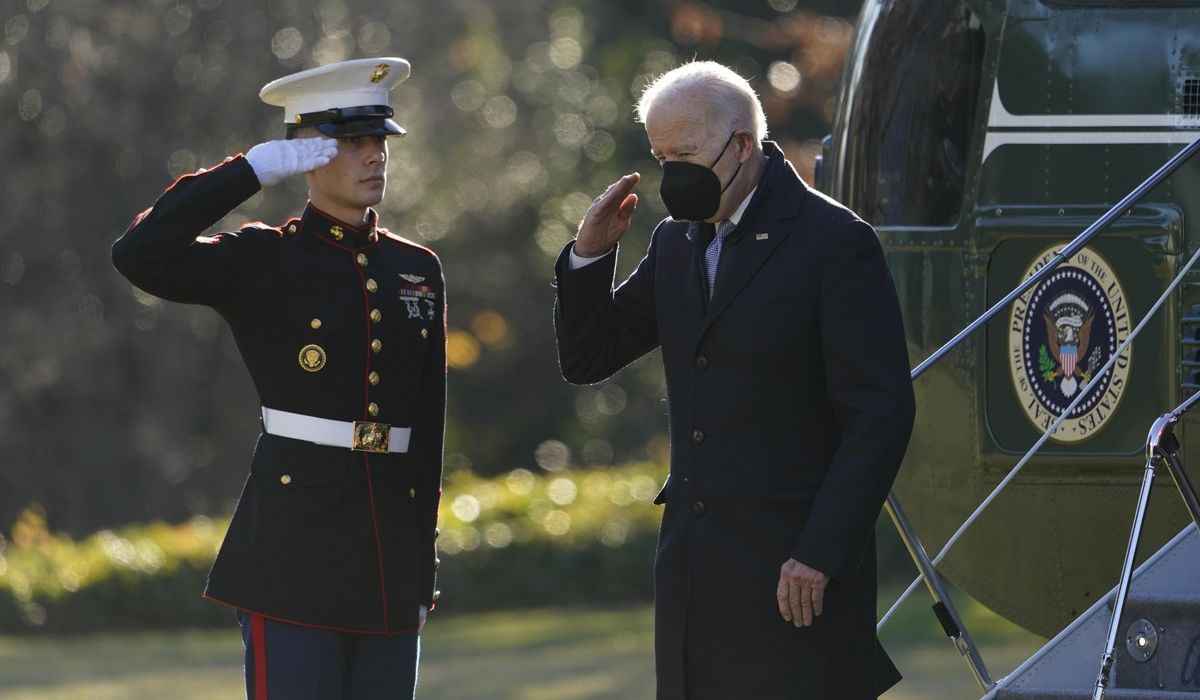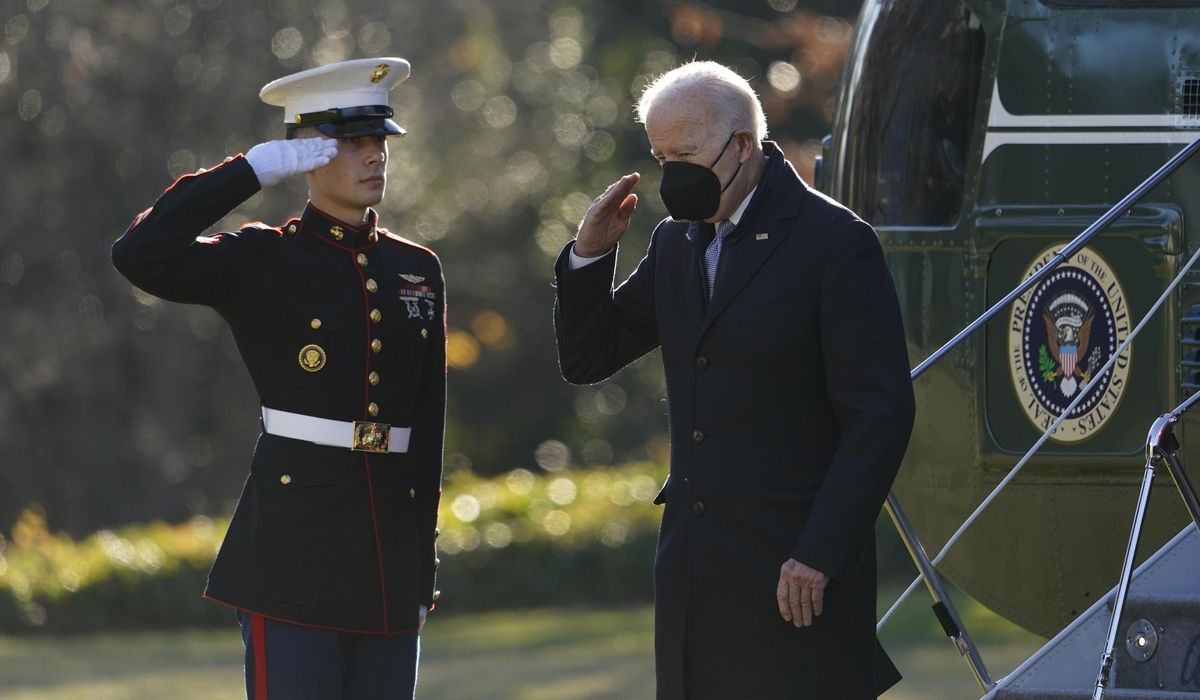
Tens of thousands of Russian troops massed on Ukraine’s border have sparked fear of a potentially imminent war in Eastern Europe, while U.S.-China tension simultaneously soars amid warnings from Beijing that Washington will pay an “unbearable price” for supporting Taiwan.
Those are just two of the foreign policy headaches facing the Biden administration at the start of 2022.
The full list is much longer: Taliban-controlled Afghanistan is teetering on the brink of collapse amid ongoing tumult from the disastrous U.S. military pullout; hopes for a new Iran nuclear deal are fading fast despite a difficult diplomatic push by America and its European allies; efforts to end North Korea’s nuclear program appear to be at a standstill; and, in Africa, Islamic terrorism is on the rise, prompting concerns the continent could be a breeding ground for attacks on the West.
Many of the most daunting national security challenges on President Biden‘s plate seemed only to grow more urgent during his first year in office, with critics charging that the president and his inner circle bungled several key decisions and irreparably damaged U.S. credibility abroad.
Administration officials sharply dispute such characterizations, arguing the withdrawal from Afghanistan ultimately will benefit the U.S., as will the end of formal combat operations in Iraq.
Mr. Biden and his supporters also point to the thawing of tensions with NATO after four years of animosity under former President Donald Trump, asserting that major positive steps are now being made in the wider U.S.-European alliance.
The administration similarly points to the robust role U.S. officials played at a global summit on climate change in 2021, and a recent virtual summit of democracies that the White House created and hosted as a way to push back at rising authoritarianism around the world — citing both gatherings as key steps for international cooperation in the 21st century, and a return to U.S. leadership in the post-Trump era.
At the same time, officials say the White House is in the midst of crafting an updated National Defense Strategy, a broad new Indo-Pacific strategy, and other pivotal policy documents that will guide Mr. Biden‘s next three years on the world stage.
Immediate threats
Despite the administration‘s efforts to project long-term calm, analysts say Mr. Biden faces an immediate crisis over the coming weeks: The prospect of a full-scale Russian invasion of Ukraine.
The president spoke by phone Thursday with his Russian counterpart, Vladimir Putin, to try and lower the temperature and prevent the Russian military from seizing more Ukrainian territory by force, as it did with Crimea in 2014. White House officials stressed that Mr. Biden still believes diplomacy can prevent conflict, but they also threatened economic sanctions and other measures if Russia invades.
“One is a path of diplomacy leading toward a de-escalation of the situation and the other is a path that’s more focused on deterrence, including serious costs and consequences should Russia choose to proceed with a further invasion of Ukraine,” a White House official told reporters on background.
The Kremlin demands the U.S. and Europe make concessions — such as promises that NATO won’t expand eastward to include Ukraine or Georgia — in order to defuse the situation.
Specialists say the powder keg along the Russia-Ukraine border represents perhaps the most pressing challenge facing Mr. Biden in the new year, with few good options on the table.
“Biden is in a no-win situation here. There’s little appetite for a shooting war in an area far away from the United States and right next door to Russia, and sending more arms to Kyiv won’t tip the balance of power enough to deter a limited Russian foray,” Stephen M. Walt, a professor of international relations at Harvard, wrote recently for Foreign Policy.
On a separate front, the president’s legacy could suffer a major blow if Afghanistan collapses in 2022 — a scenario many analysts believe is increasingly likely.
Despite clear warning signs that the Taliban was poised to rapidly take over the country, Mr. Biden last summer proceeded with the withdrawal of all American forces after 20 years of war. The chaotic, bloody U.S.-led airlift from Kabul remains the most enduring foreign policy image from the president’s first year.
But with the Taliban now back in full control, the country is faced with a massive humanitarian crisis. The administration has struggled to strike a balance between providing as much food, medicine and financial help as it can to Afghan civilians while still refusing to recognize the militant Islamist Taliban as a legitimate governing body.
The situation on the ground appears untenable. Should Afghanistan collapse, the country almost surely would once again become an epicenter for Islamic extremist terrorism.
“Afghanistan is enduring an unprecedented humanitarian crisis, and possible state collapse looms in 2022,” Mathew Burrows and Robert Manning, analysts with the Atlantic Council, wrote in a recent 2022 forecast. “The Taliban is contending with rival jihadist groups such as the Islamic State, raising the risks of increased terrorist activity around the world — including possible attacks against U.S. interests as well as those of Russia and China.”
Diplomacy first
On the broader foreign policy front, Mr. Biden faces the long-term, high-stakes question of how best to confront an increasingly powerful and aggressive China.
Just this week, top Chinese officials warned the U.S. about its political and military support for Taiwan, which China considers a breakaway province. By supporting Taiwanese forces, “the United States not only puts Taiwan into an extremely dangerous situation but also exposes the United States to an unbearable price,” said Chinese Foreign Minister Wang Yi, according to Reuters.
The administration has tried to walk a tightrope on China, cooperating on issues such as climate change while deeply at odds over Chinese military expansion in the South China Sea, Beijing‘s alleged rampant human-rights abuses and the Chinese Communist Party’s theft of U.S. intellectual property.
Those and other factors led Mr. Biden to announce a diplomatic boycott of the upcoming Winter Olympics in Beijing. Australia, Canada and Britain have joined the boycott, though it has failed to garner support beyond that.
Mr. Biden and Pentagon leaders also are preparing for the possibility that China conducts more major weapons tests in 2022, as it did last summer with the surprise launch of a cutting-edge hypersonic weapons system that circled the globe and is capable of carrying nuclear warheads.
Against that backdrop, U.S. officials have tried to rally Pacific allies to their cause and are pushing an economic alternative to China‘s massive economic investments around the world as part of a plan to blunt China‘s growing power.
“We will forge stronger connections within and beyond the region. We’ll deepen our treaty alliances with Japan, the Republic of Korea, Australia, the Philippines, and Thailand,” Secretary of State Antony Blinken said in a major speech on the Indo-Pacific earlier this month. “Those bonds have long provided the foundation for peace, security, and prosperity in the region. We’ll foster greater cooperation among these allies, as well.”
“We’ll find ways to knit our allies together with our partners, as we’ve done by reinvigorating the Quad,” Mr. Blinken said, referring to the pro-democracy U.S. alignment with Japan, Australia and India.
While they are at odds on a host of issues, the U.S. and China could be on the same side of the negotiating table in trying to forge a new nuclear deal with Iran that would limit Islamic republic’s nuclear program in exchange for relief from some economic sanctions.
Returning the U.S. to the Iran nuclear deal — formally known as the Joint Comprehensive Plan of Action, or JCPOA, which Mr. Trump exited in 2018 — was a key initial foreign policy priority for Mr. Biden.
But the talks have made little progress over the past year and administration officials in recent weeks have sounded an especially pessimistic note.
White House National Security Adviser Jake Sullivan, for example, conceded in December that the talks are “not going well.”
Meanwhile, Iran continues its provocations. Recent days saw the Iranian military launch a rocket purportedly carrying research payloads into space. Some analysts say Mr. Biden should view the launch as directly connected to the nuclear issue and as proof that Tehran is racing ahead with dangerous weapons programs.
“The Biden administration should not miss the connective tissue between these events,” said Behnam Ben Taleblu, a senior fellow with the think tank Foundation for Defense of Democracies. “Tehran is intent on building not just leverage in the missile, military, and nuclear domains, but new capabilities.”








